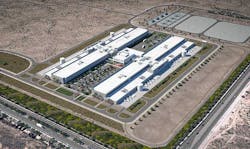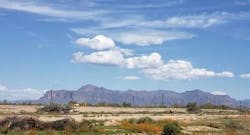Facebook Unveils Water Projects to Support $800 Million Mesa Data Center
There was little suspense about the eventual unveiling of Facebook as the undisclosed company behind a giant new data center project in Mesa, Arizona. The biggest question was how the company would address concerns about the $800 million project’s impact on scarce water resources.
The Facebook project drew national attention when a Mesa council member expressed concerns about reports that the data center might use as much 1 million gallons of water a day, calling it “an irresponsible use of our water.”
On Thursday’s official announcement of the new data center, Facebook outlined three water restoration projects that will restore more than 200 million gallons of water per year in the Colorado River and Salt River basins and help provide greater water security for Arizona. The company said the 960,000 square foot Mesa facility will use 60 percent less water than the typical data center due to extensive use of fresh air for cooling. Facebook told local media that it will not draw water rights from the city of Mesa.
“We know water is a concern, so we want to make it clear that Facebook is committed to restoring more water than our data center will consume into watersheds in Arizona,” the company said. “We’re excited to contribute to projects that are stabilizing water levels in Lake Mead, leaving more water flowing in Oak Creek, and providing permanent drinking water to Navajo Nation families in Arizona.”
The water conservation measures echo those seen in Microsoft’s recent announcement of its new cloud region in Goodyear, west of Phoenix, which featured a multi-faceted approach water concerns that included technology, community outreach and collaboration with conservation groups.
Drought is Stressing Arizona’s Water Resources
When the Mesa project was announced, speculation about the mystery applicant immediately focused on Facebook, which is the only hyperscale operator without a presence in the Phoenix market. Phoenix has become one of the most dynamic data center growth markets, and is now the fifth-largest market for data center capacity in the U.S., trailing Northern Virginia, Silicon Valley, Dallas and Chicago.
Users have long sought space in Phoenix as an alternative to California locations with higher cost and disaster risk, and in recent years the region has become a major hub for cloud computing.
Mesa Vice Mayor Jenn Duff was the lone dissenter as the council voted 6-1 to approve the project, saying Arizona’s groundwater supply is being used too quickly, creating long-term risks to the water availability. Duff’s critiques have been central to both local and national media scrutiny of the data center industry’s stewardship of water resources amid a widespread drought across the Southwest.
In Arizona, 83 percent of the state is currently facing “severe drought” conditions, according to the U.S. Drought Monitor. That challenge is reflected in this week’s headlines:
- Arizona is expected to lose about one-fifth of its Colorado River water supply, equal to 512,000 acre-feet of water, because of a statewide drought, the AP reported.
- Those shortages are projected to limit water availability for Arizona farmers.
Arizona’s water crisis is reflected in the debate in Mesa, which highlights the tensions between business and environmental concerns. Economic development officials in Mesa have actively courted data centers to locate in the Elliott Road Technology Corridor, where there are now 732 megawatts of data center capacity in the pipeline. Apple and EdgeCore operate data centers in Mesa’s Elliott Road Technology Corridor, with future projects planned by Google, NTT Global Data Centers Americas, Digital Realty, CyrusOne and EdgeConneX.
Mesa on the Forefront of Phoenix Cloud Growth
In addition to robust power infrastructure, the Elliot Road Technology Corridor has Foreign Trade Zone status, and the city of Mesa has created a Planned Area Development Overlay Zone that “reduces entitlement risk and expedites the development process.” The area also offers a recycled water loop.
“Facebook joins other tech giants in making the wise decision to locate in Mesa’s Elliot Road Tech Corridor,” said Mesa Mayor John Giles. “Our city’s robust infrastructure and overall livability coupled with Facebook’s boost to economic vitality and commitment to give back in the community make this a good match for Mesa.”
A view of the mountains in Mesa, Arizona, as
seen from the Elliott Road Technology Corridor. (Source: Data Center Frontier)
“Mesa stood out as a great location for a number of reasons,” said Rachel Peterson, VP of Infrastructure at Facebook. “It has great access to infrastructure, opportunities for renewable energy development, strong talent for both construction and operations, and great community partners.”
Facebook continues a massive global expansion of its infrastructure. Over the past year, it has announced new data centers in Illinois and Tennessee, as well as major expansions of existing campuses in Utah, Georgia and Prineville, Oregon, where the company is rolling out a multi-story data center design featuring two floors of server rooms to boost capacity.
In Mesa, Facebook will work with local utility Salt River Project to bring 450 megawatts of new solar energy to the local electric grid. These projects, located in Pinal County, will bring additional jobs and investment to the region. This is also part of our effort to limit the amount of water used, as renewable energy uses less water than fossil fuels.
The data center is expected to create 100 full-time jobs, while up to 1,500 construction workers will be on site at the peak of construction. Facebook said it will soon post job opportunities, and directed construction inquiries to DPR Construction.







